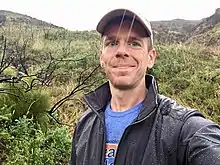Jeremy Yoder | |
|---|---|
 Yoder in 2020 | |
| Alma mater | Eastern Mennonite University (B.S.) University of Idaho (Ph.D.) |
| Scientific career | |
| Fields | Coevolution, population genomics |
| Institutions | California State University, Northridge |
| Thesis | Species interactions and the origins of biological diversity (2011) |
| Doctoral advisor | Olle Pellmyr |
| Website | jbyoder |
Jeremy B. Yoder is an American evolutionary biologist, science communicator and LGBTQIA+ advocate. He is an assistant professor of biology at California State University, Northridge.
Education
Yoder completed a B.S. at Eastern Mennonite University in 2004.[1] He earned a Ph.D. from University of Idaho in 2011. His doctoral advisor was Olle Pellmyr.[2] Yoder's dissertation was titled Species interactions and the origins of biological diversity.[3] He completed a postdoc at University of Minnesota with Peter Tiffin. Yoder conducted further postdoctoral studies at University of British Columbia under Sally Aitken.[2]
Career and research
Yoder is an evolutionary biologist, science communicator and LGBTQIA+ advocate.[4] He joined California State University, Northridge as an assistant professor of biology in 2017. Yoder studies "coevolution and the population genomics of local adaptation, particularly in mutualisms."[2] He researches how the ecological impacts of different climates, biological communities, and habitats relate to biodiversity by conducting field studies and using mathematical modelling and population genomic data.[1] Through the analysis of a global database, Yoder and his colleagues have studied pollination interactions of zygomorphic flowers. He discovers that plants with zygomorphic flowers have fewer visitor species possibly because of their manipulations of pollinator behaviors. His finding suggests that plant taxa with zygomorphic flowers are more susceptible to extinction due to pollinator loss.[5] In 2013, Yoder collaborated with Allison Mattheis on research investigating the experiences of LGBTQIA+ identifying individuals in STEM.[6] He is a collaborator with the Joshua Tree Genome Project and the Queer in STEM study of LGBTQ experiences in scientific careers. He has written for the website of Scientific American, the LA Review of Books, the Chronicle of Higher Education, The Awl, and Slate.[7]
Personal life
Yoder identifies as gay.[4][8][9] He is an advocate for LGBTQIA+ individuals in STEM.[10]
References
- 1 2 "Jeremy B Yoder | CSUN". academics.csun.edu. Retrieved 2019-07-11.
- 1 2 3 "Society for the Study of Evolution". www.evolutionsociety.org. Retrieved 2019-07-11.
- ↑ Yoder, Jeremy B. (2011). Species interactions and the origins of biological diversity (Thesis). OCLC 793747383.
- 1 2 Mattheis, Allison; De Arellano, Daniel Cruz-Ramírez; Yoder, Jeremy B. (2019-05-13). "A Model of Queer STEM Identity in the Workplace". Journal of Homosexuality. 67 (13): 1839–1863. doi:10.1080/00918369.2019.1610632. ISSN 0091-8369. PMID 31082315. S2CID 153311576.
- ↑ Yoder JB, Gomez G, Carlson CJ (2020). "Zygomorphic flowers have fewer potential pollinator species". Biology Letters. 16 (9). doi:10.1098/rsbl.2020.0307. PMC 7532724. PMID 32871089.
- ↑ "Queered Science: Jeremy Yoder, Allison Mattheis and Surveying Queers in STEM". Autostraddle. 2013-10-25. Retrieved 2020-11-18.
- ↑ "Jeremy Yoder". The Molecular Ecologist. Retrieved 2021-05-26.
- ↑ "Fullscreen Page | 500 Queer Scientists | Stories". 500 Queer Scientists. Archived from the original on 2019-07-12. Retrieved 2019-07-12.
- ↑ Yoder, Jeremy (2019-06-18). "Researchers May Soon Be Able to Isolate the Genetic Roots of Homosexuality—but Should They?". Slate Magazine. Retrieved 2021-10-08.
- ↑ Barres, Ben; Montague-Hellen, Beth; Yoder, Jeremy (2017-04-04). "Coming out: the experience of LGBT+ people in STEM". Genome Biology. 18 (1): 62. doi:10.1186/s13059-017-1198-y. ISSN 1474-760X. PMC 5379691. PMID 28372568.
External links
- Official website
- Jeremy Yoder publications indexed by Google Scholar